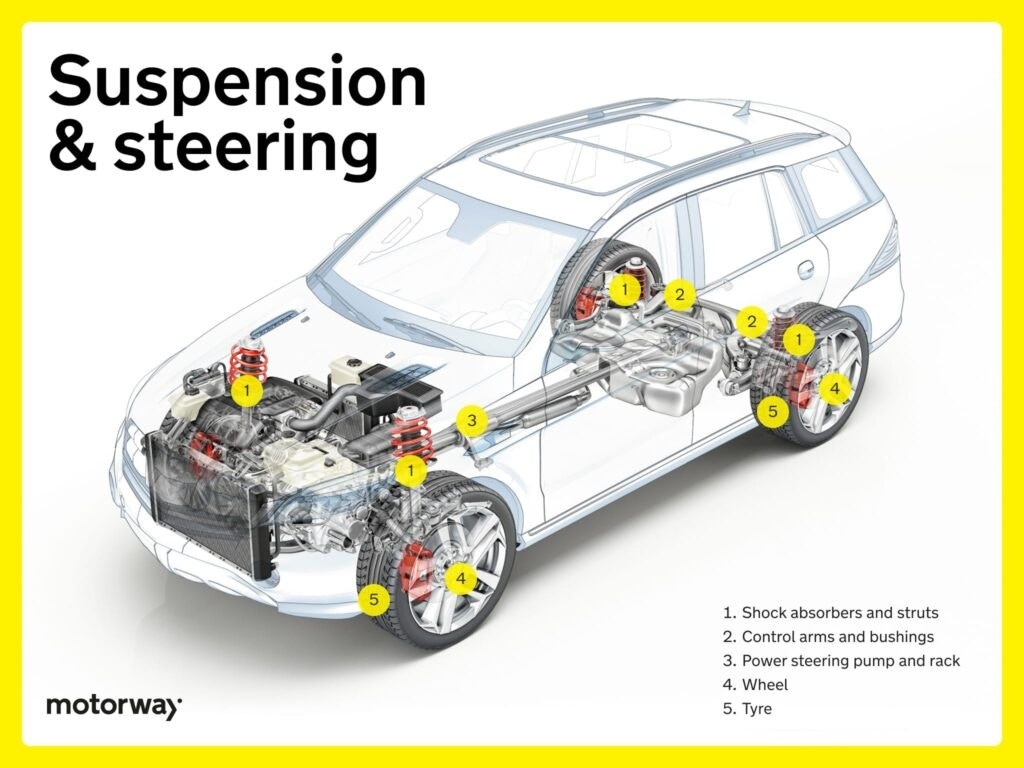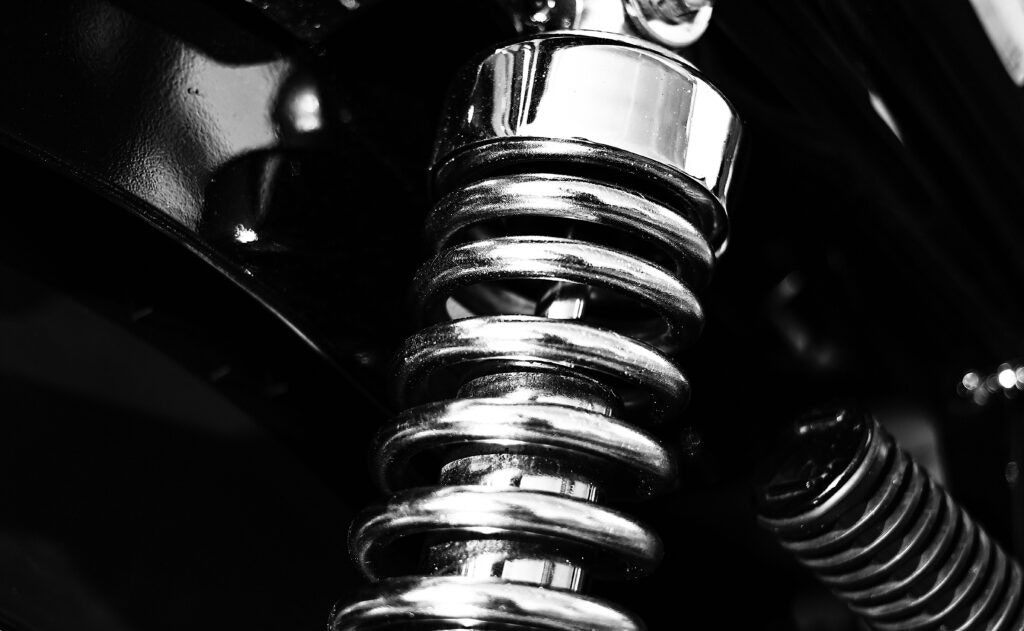Your car’s suspension is key to a comfortable and safe driving experience. It’s the unsung hero that smooths out bumpy roads and keeps your vehicle stable when cornering. Whether you’re thinking about routine maintenance or facing noticeable issues, understanding the costs associated with suspension repair in the UK is essential, especially if you’re considering selling your car down the line.
Depending on the extent of the problem, from replacing a single worn part to overhauling the entire system, car suspension repair costs in the UK can range from approximately £200 to £3,500. Let’s delve into the factors influencing these costs and what you can expect to pay to keep your ride smooth and safe.
Understanding Your Car’s Suspension System
The suspension system is essentially the connection between your car’s body and its wheels. It’s a complex network of components working together to ensure a comfortable ride and stable handling. This system is primarily composed of springs, shock absorbers, struts, and various linkages.
Springs bear the weight of your vehicle and absorb major impacts from the road. Shock absorbers and struts (which combine shock absorption and structural support) dampen the spring’s oscillations, preventing excessive bouncing. Linkages and bushings connect these parts, allowing for controlled movement and maintaining wheel alignment. Collectively, these components work in harmony to absorb road shocks, maintain consistent tyre contact with the road surface, enhance steering stability, and contribute to overall vehicle control. A well-functioning suspension system translates directly to a comfortable, predictable, and safe driving experience.
Recognizing the Signs of Suspension Problems
Knowing when your suspension needs attention can save you money and prevent safety issues. Here are some key indicators to watch out for:
Uneven Tyre Wear
If you notice your tyres are wearing down unevenly, particularly with patches of significantly more wear on the inner or outer edges, it’s a strong indication of suspension misalignment or worn components. When suspension parts are compromised, they can cause improper wheel angles, leading to tyres scrubbing against the road surface unevenly. Regularly checking your tyre wear patterns can provide early warnings of suspension problems.
Excessive Bouncing or a Rough Ride
Has your smooth ride become noticeably bumpy? A classic test for worn shocks or struts is the “bounce test.” Push down firmly on the front or rear of your vehicle, over a wheel. Release quickly and observe how the car rebounds. Excessive bouncing, meaning the car continues to oscillate up and down several times, suggests that your shock absorbers or struts are losing their ability to dampen movement effectively. A deteriorating ride quality and increased sensitivity to road imperfections are also tell-tale signs.
Knocking or Clunking Noises While Driving
Unusual noises from your suspension are never a good sign. Listen for knocking, clunking, or rattling sounds, especially when driving over bumps or uneven road surfaces. These noises often point to loose, worn, or damaged suspension parts such as bushings, ball joints, or linkages. Ignoring these sounds can lead to further damage and potentially more costly repairs down the line.
Poor Steering Response and Handling Issues
Your car’s suspension plays a crucial role in steering responsiveness and overall handling. If you experience a delayed steering response, a feeling of looseness in the steering, or if your car drifts or pulls to one side, particularly when cornering, it could signal suspension problems. These issues can compromise your control of the vehicle, especially in emergency situations.
Visible Damage and Leaks
A visual inspection of your suspension components can reveal obvious signs of trouble. Look for leaking fluid on shock absorbers or struts – this indicates a seal failure and loss of damping capability. Also, check for physical damage such as broken or cracked springs, bent linkages, or worn bushings. Any visible damage is a clear signal that suspension repair or replacement is necessary.
Factors Affecting Car Suspension Repair Costs in the UK
The cost of car suspension repair in the UK isn’t fixed; it’s influenced by a range of factors specific to your vehicle and the nature of the repair needed. Understanding these factors will help you anticipate and budget for potential expenses.
Car Make and Model
The make and model of your car is a significant cost determinant. Luxury vehicles and high-performance cars often have more sophisticated and complex suspension systems that utilize specialized components. These parts are typically more expensive than those for standard vehicles. For example, repairs on a prestige brand like BMW or Mercedes-Benz will likely carry a higher parts and labour cost compared to a Ford or Vauxhall.
Suspension System Type
Different vehicles employ various suspension designs. Common types include coil spring suspensions, strut-based suspensions, and air suspension systems. Strut-based systems, which integrate shock absorption and structural support into a single unit, tend to be more complex and costly to repair than simpler coil spring setups. Air suspension systems, often found in luxury cars and SUVs, are the most technologically advanced and, consequently, the most expensive to repair due to their intricate components and control systems.
Quality and Brand of Replacement Components
When it comes to replacement parts, quality and brand matter. You’ll generally have a choice between Original Equipment Manufacturer (OEM) parts and aftermarket parts. OEM parts, manufactured by the car’s maker or approved suppliers, guarantee a precise fit and maintain the original quality standards. Aftermarket parts offer a wider range of brands and price points. While some aftermarket brands provide excellent quality at competitive prices, opting for very cheap, unbranded parts can compromise durability and longevity, potentially leading to more frequent repairs in the long run. Investing in reputable brands, whether OEM or aftermarket, often proves more cost-effective over time.
Labour Costs and Location
Labour charges constitute a significant portion of suspension repair expenses. Mechanic labour rates vary across the UK, with urban areas, particularly London and the South East, generally having higher rates than rural locations. The complexity of your car’s suspension system also affects labour time. More intricate systems or repairs requiring specialized tools will naturally incur higher labour costs. Getting quotes from local garages will give you a clearer picture of labour costs in your specific area.
Average Car Suspension Repair and Replacement Costs in the UK
To give you a practical idea of costs, here are some average ranges for suspension repair and replacement in the UK market. Remember these are estimates, and actual costs can vary.
Typical Cost Ranges
For minor suspension repairs, such as replacing a worn bushing or a single shock absorber, you might expect to pay between £200 and £500, including parts and labour. More extensive repairs, like replacing multiple components or overhauling a significant portion of the system, can range from £500 to £1,500. In cases where the entire suspension system needs replacement, particularly on high-end vehicles or those with air suspension, costs can escalate to £2,000 to £3,500 or even higher.
Model-Specific Examples
For popular car models, you can get a more specific idea:
- Ford Focus: Suspension replacement costs for a Ford Focus typically range from £300 to £600.
- BMW 3 Series: Due to its more complex suspension, replacement on a BMW 3 Series can range from £600 to £1,200.
These are just examples; always get a tailored quote for your specific car.
Regional Cost Differences
As mentioned earlier, regional variations in labour costs will influence the final price. Expect to pay slightly more for suspension work in major cities compared to smaller towns or rural areas. Parts availability can also play a minor role in regional price differences.
DIY vs. Professional Suspension Replacement
Deciding whether to tackle suspension repairs yourself or hire a professional mechanic is a common dilemma for car owners. Here’s a breakdown of the pros and cons to help you make an informed choice:
| Pros | Cons |
|---|---|
| ✔️ Cost savings, especially on labour costs. | ❌ Requires technical expertise and tools not always found in your toolbox. |
| ✔️Replacing your suspension yourself gives you the opportunity to learn about your car’s mechanics. | ❌ Replacing your suspension can be time-intensive. |
| ✔️Ability to work at your convenience and at your own pace, rather than reorganising your schedule for a mechanic appointment. | ❌ Increased risk of error when DIY-ing. Incorrect suspension installation may lead to safety hazards. |
| ✔️Sense of accomplishment in completing the task. | ❌ Lack of warranty – professional mechanic work often comes with warranties protecting against future issues. |



For experienced DIY mechanics with the right tools and in-depth knowledge of car suspension systems, DIY replacement can save money on labour costs. However, suspension work can be complex, requiring specialized tools like spring compressors and a good understanding of torque specifications. Incorrect installation can lead to serious safety hazards, affecting braking, handling, and stability.
Hiring a professional mechanic offers several advantages. Mechanics possess the expertise, experience, and specialized tools to accurately diagnose suspension issues and perform replacements safely and efficiently. They can also advise on the best replacement parts for your vehicle and driving needs. Furthermore, reputable garages typically provide warranties on their work and parts, offering peace of mind and protection against future problems. For most car owners, especially those without extensive mechanical experience, professional suspension replacement is the safer and more reliable option.
Saving Money on Suspension Repairs
While suspension repairs can be costly, there are ways to potentially reduce your expenses:
Get Multiple Quotes
Always obtain quotes from several garages before committing to suspension work. Compare not just the overall price but also the breakdown of parts and labour costs. Don’t automatically choose the cheapest quote; consider the garage’s reputation, reviews, and warranty offered.
Check Insurance Coverage
Review your car insurance policy to see if it covers any suspension damage, particularly if it’s related to an accident or specific types of mechanical failures. Some comprehensive policies or extended warranties might offer coverage for certain suspension components. It’s worth investigating whether your insurance can offset any of the repair costs.
Maintaining Suspension System Health
Preventative maintenance is key to extending the lifespan of your suspension and avoiding premature repairs.
Regular Inspections
Include suspension checks as part of your routine car maintenance. During regular servicing, ask your mechanic to inspect suspension components for wear, damage, and leaks. Early detection of minor issues can prevent them from escalating into major, costly repairs.
Promptly Address Issues
Don’t ignore warning signs of suspension problems. Address any unusual noises, handling changes, or visible wear promptly. Delaying repairs can lead to further damage to other suspension components and even tyres, ultimately increasing your overall repair bill and potentially compromising safety.
FAQs
Can I drive with a faulty suspension system?
Driving with a faulty suspension system is strongly discouraged and unsafe. It compromises vehicle control, steering, and braking, increasing the risk of accidents. It can also cause further damage to your car. Address suspension issues immediately.
How often does a car’s suspension need to be replaced?
There isn’t a fixed replacement interval. Suspension lifespan depends on driving conditions, vehicle type, and maintenance. Generally, expect suspension components to last between 50,000 and 100,000 miles. Regular inspections are crucial for determining when replacement is needed.
Are there any warranty options for suspension replacements?
Yes, warranty options are usually available. OEM parts often come with manufacturer warranties. Reputable garages also typically offer warranties on their labour and the parts they install. Inquire about warranty details before proceeding with any suspension work.
Is replacing my suspension worth it?
Absolutely. Replacing a worn suspension is a worthwhile investment in your safety, ride comfort, and vehicle’s overall performance. It ensures proper handling, stability, and can prolong the life of other car components. A well-maintained suspension also enhances your car’s resale value.
How much does it cost to fix your car suspension?
The cost to fix car suspension varies widely, from around £100 for very minor repairs to £300 or more for more significant component replacements, including parts and labour. The specific cost depends on the car model, suspension type, and the parts needing repair.
What causes a broken suspension?
Suspension damage can result from normal wear and tear over time, particularly to shocks and springs. Poor road conditions, such as potholes and rough surfaces, contribute to component stress and damage. Accidents, lack of regular maintenance, and corrosion due to exposure to harsh weather conditions also play a role in suspension breakdowns.
Need to sell your car?
Want to learn more about owning, maintaining, and selling your car? Check out more of our guides here, covering everything from Clean Air Zones to car tax, and plate changes to part exchange.

